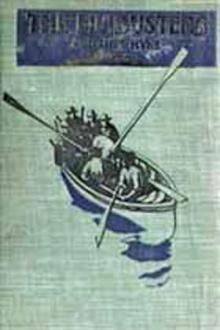The Filibusters - Charles John Cutcliffe Hyne (best english books to read for beginners .TXT) 📗

- Author: Charles John Cutcliffe Hyne
- Performer: -
Book online «The Filibusters - Charles John Cutcliffe Hyne (best english books to read for beginners .TXT) 📗». Author Charles John Cutcliffe Hyne
“Well,” the General concluded, ” after that it did not take us long to come to terms. He was the man I wanted, and mine was just the employ, ment to cure his morbid turn of mind. You know how he has thrown himself heart and soul into the cause already. You have seen for yourself what brilliant promise there is in him.”
“If you ask me, General, I should say Fluellen is about the pick of your lot.”
“I believe he is, Birch, I believe he is. And now at the last moment I have grave doubts as to whether it is wise to take him out with us. I have just discovered that the man whom this Miss Julia Armitage married is no other a person than Don Juan Carmoy.”
I whistled. ” The second biggest man in Sacaronduca this minute. And it is a toss-up whether he throws in his lot with us or with the existing government. Does Fluellen know he’s out there?”
“He does not. I am certain of that. But he cannot fail to know it sooner or later, and then” the General completed his sentence with a suggestive shrug.
Knowing Fluellen, and knowing Don Juan I should say they are by no means likely to fight in friendly fashion side by side. If you do get Don Juan (which is problematical) and you turn Fluellen away, it is a certain thing that he will go over to the enemy, and on your own showing he will add a considerable weight to their fighting strength. If on the other hand you keep Fluellen and let Don Juan go to the deuce (which he is likely to do anyway) you will give your man an additional spur to make our side win, and make him almost diabolic in his usefulness.”
“Yes,” said the General thoughtfully, ” I believe you are right on the whole. We have got to have Fluellen in the broil, one side or the other, and with every ounce of his wit and energy on the strain. I believe he would go far to wreck us if he was in the opposition, and Juan is a slippery rascal anyway. But there is one other thing,” the General added (it seemed to me) almost shyly, “the Sefiora Carmoy is, I know, a dear friend of Delicia’s. That may complicate matters in a way you will not understand.”
I looked up in surprise. ” Who is Delicia?” I asked; ” you have never spoken of her before that I know of.”
The General got up and began putting on his hat and great coat. ” I must go out now to see Holsteins. Expect me back to dinner at eight. Delicia? Donna Delicia, that is? Oh, well, I expect you’ll hear plenty about her later. She’s a very remarkable woman.”
IT has never been my way to thrust myself forward, and perhaps owing to that cause I was what I was when Briggs first met me to wit, purser on a transatlantic liner. If I had cared to truckle more to captains and owners probably by the time I was two and forty I should have found myself in a snug berth at the Liverpool office instead of knocking backwards and across over the Western Ocean, worrying over a ship’s accounts and domestic economy, and acting as master of the ceremonies to an always changing crew of passengers.
I had a mind at the beginning of this history to have kept myself entirely in the background; to have appeared only as the nameless scribe who wrote it out; and held my small identity in the private locker of a publisher’s office. But it occurs to me, as the ink runs out upon the paper, that what took place in Sacaronduca cannot be explained with full accuracy unless my own name appears here and there upon the pages, because the Fates and General Briggs decreed that certain small actions of my own should have their trivial bearing upon the history which was made. And so under this impression the introduction is made.
It was on my own steamer, coming out of New York, eastward, that I saw Briggs for the first time. We had a devil of a passage of it: heavy easterly gales with a terror of a sea running, and he was one of the very few passengers who were not knocked over with it. I met him in the smokeroom during the first two or three days out, where we chummed easily, and rather took to one another; and then I asked him down to my own room, to which he afterwards found his way most days till we made Queenstown Harbour.
By that time we had come to a rather curious agreement. I was to throw up the work I had been at all my life (a thing I could never have fancied myself doing) and accept service under him as private secretary; at a slightly increased salary to my purser’s pay; with prospect of a high position if Briggs ascended the presidential throne. Moreover I was to commence my duties on that day week; which, after a small tornado at the office (where I dirtied my ticket most finally), was done punctually. It is a curious thing, and perhaps worthy of comment, that the General declined to look through my testimonials. I remember at the time I felt rather badly annoyed, because some handsome things were said of me in the papers, which, of course, I could not in decency repeat by word of mouth. But as I had ample means of learning afterwards, the omission was the man’s common habit. He never trusted the opinion of anyone else about anybody; always preferring the judgment of his own eyes and his own ears from half an hour’s talk; and I must say (on the whole) profiting largely by the method.
Now I think I will omit the full account of what happened after Fluellen, Coffin, and Sir William Carew went off to the corners of the empire to recruit soldiers of fortune. That time was filled in with the dry detail of office work (carried on secretly at the Hotel Metropole, in London); and with seeing Davis between his round of visits to arms factories, and the host of other places where the multitude of his duties called him.
But at this point it is my duty to record that much of the initial success of the expedition was due to that same fellow Davis’s shrewd-headedness and business tact. As a personal matter I must candidly confess to have never liked the man. If he had been contented to remain what God made him, a clever, honest, diligent fellow, a worker by birth, and an engineer by rating, he would have been palatable enough; moreover he would have succeeded far better in a worldly degree. But when he tried to pose as what he was not and never would be, and that is a gentleman; and when he persisted in quoting from that most poisonous thing, a Book of Etiquette, then my stomach would rise at the man, and I could barely refrain from insulting him to his face.
Still, it is only just to own that he was popular enough with the others. Fluellen, perhaps, took little notice of him, in the same way that he more or less ignored everybody, not being a man of much speech; but the General appreciated him much for his undoubted usefulness; and the other two seemed really to like him for himself. It is true they used openly to laugh at him; but they only did it before his teeth, and defended him when he was away, as though he had been fianceVs brother to each of them.
Davis’s work was a matter requiring a perilous amount of commercial delicacy. If he had gone to a gunmaker and said, ” I want so many stand of rifles to arm a filibustering expedition to Sacaronduca,” we should have failed at the outset. True, the weapons might have been delivered at the door of the factory, on substantial prepayment; but Birmingham is not a port on the Mexican Gulf, and buying and transporting are two very different matters. Everything had to be gone about with the most profound caution and secrecy, and, of course, paid for accordingly.
To give the British arms-maker his due, he is always ready to supply contraband of war to anyone who will give him-money for it, even though he knows for a certainty that the material will be used against his own countrymen. He is amply devoid of scruples in this respect, having, of course, his business and the profits thereof to look after first before such a trivial matter of ethics could come into play. But he is not above salving his conscience with a revised price-list, and puts each item of secrecy required as so much per cent, on the bill.
It was the same way too with the wholesale clothiers in Leeds who turned out our uniforms: they must have made a good thing out of it for the consideration of holding their tongues over the transaction. And (most crucial place of all) it was the method adopted by the small shipowner who ferried out our dangerous cargo. He alone of all the people we dealt with I saw myself; a small stuffy creature with a stutter and a perpetual perspiration; who owned two little old steamers, and had a few sixty-fourths in others; but who had lately purchased what was the apple of his eye, a ten-knot cargo boat of nine-hundred tons. By an effort of weak sentiment he had named her the Clarindella.
How that man bullied, and whined, and trembled I shall never forget; nor how his collar melted to a formless rag as he recounted the risks; nor how he niggled at sixpences whilst he swore to being robbed of hundreds of pounds. In reality he had little to stake, seeing that one can underwrite any sea-risk if one only pays the insurers sufficient guineas per cent. But this blessed Clarindella was the triumph of a lifetime of sordid scraping: in his poor struggling little mind she was the cream of all cargo boats rendered down into one perfect craft; and he could not have been more jealous of her movements if she had been his daughter. He could not allow this to be done with her, that, t’other; on no account could he leave down the carpet in the chart-house (which had cost 2s. gd. a yard) or the new dodgers he had got for the upper bridge. Indeed, if he had been let go on, I believe he would have insisted on having the engines brought ashore and laid in tallow, for fear that they would rust if sent to sea in such evil company.
But an ultimatum was put before him at last which he had to accept or refuse, and he produced a sixpenny charterparty stamp and signed himself into a small competence with a few trembling strokes of the pen.
The thing was over and settled, but he promptly broke out again. Would we





Comments (0)